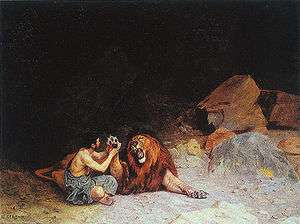Androcles and the Lion

Androcles and the Lion by Jean-Léon Gérôme (11 May 1824 – 10 January 1904)
Androcles and the Lion, a 1912 play by George Bernard Shaw, is a re-telling of one of Aesop's Fables. In the fable and the play, Androcles, a Christian slave in Roman times, is surprised by a lion in the forest. Seeing that the lion has a thorn in its paw, Androcles pulls the thorn out. Shortly thereafter, Androcles is arrested and thrown to the lions in the Coliseum...only to face the lion that he helped. The lion refuses to harm Androcles--and although, in Shaw's play, the Romans are still willing to hurt what they call "a Christian sorcerer", they're not nearly so eager to fight their way past an angry lion to do so.
The work is available for free on Project Gutenberg here.
Tropes used in Androcles and the Lion include:
- Androcles' Lion: A retelling of the Trope Namer.
- Baby Talk: Here's an example of Androcles talking to the lion: "Oh, poor old man! Did um get an awful thorn into um's tootsums wootsums?"
- Badass Damsel: Lavinia, a Christian who turns her execution into an act of defiance by telling Caesar that she and the other Christians forgive him and then informs a guard captain who loves her that she is not willing to die for stories or dreams, but that she will die for something greater.
- The Beast Master: Androcles. He establishes a lifelong bond with a wild lion through one act of kindness.
- Beware the Nice Ones: When the hungry lion threatens the Emperor, Androcles doesn't have the slightest problem with using the situation to the advantage of himself and the other Christians.
- Brawn Hilda: Shaw does some Lampshade Hanging with Megaera. Among other things, she says: "...just because I look a big strong woman, and because I'm good-hearted and a bit hasty, and because you're always driving me to do things I'm sorry for afterwards, people say "Poor man: what a life his wife leads him!"" She clearly thinks that she averts the trope, but in fact Shaw plays it pretty straight.
- Empathy Pet: The lion simply will not harm the man who helped alleviate his pain...despite being starved before being let into the arena, considerable pressure from the Romans, and Androcles' Baby Talk.
- Fluffy Tamer: Androcles regards the lion as an adorable kitten that he calls "Tommy." Naturally, no one else sees the lion this way, which convinces most of the Romans that he's a sorcerer.
- Meaningful Name: "Androcles" (or Ανδροκλης) is Greek for "glory of a man." This has been the character's name since Aesop's time, making this one Older Than Feudalism. Characters with significant names that Shaw introduced include Ferrovius, a pious blacksmith who once worshiped Mars, the god of war ("ferrum" is Latin for "iron" and, metaphorically, for "sword"); Spintho, the coward who flees directly into the lions' den ("spinto" is Italian for "pushed"); and Lentulus, the not-very-bright patrician who taunts the Christians, bears a name that is both the name of a family in the patrician gens Cornelia and the Latin adjective for "somewhat slow." (The adjective actually refers to speed, not intelligence.)
- Tiny Guy, Huge Girl: The stage directions describe Androcles and his wife Megaera this way: He is a small, thin, ridiculous little man who might be any age from thirty to fifty-five. He has sandy hair, watery compassionate blue eyes, sensitive nostrils, and a very presentable forehead; but his good points go no further; his arms and legs and back, though wiry of their kind, look shriveled and starved. His wife is a rather handsome pampered slattern, well fed and in the prime of life.
This article is issued from Allthetropes. The text is licensed under Creative Commons - Attribution - Sharealike. Additional terms may apply for the media files.